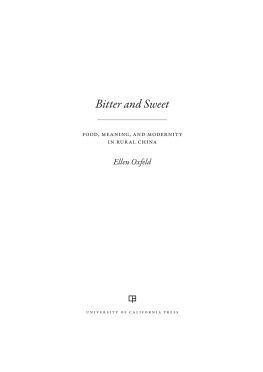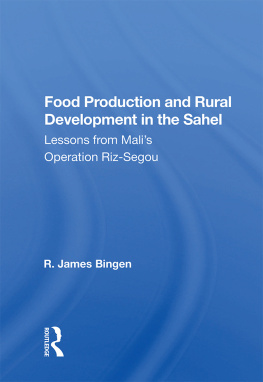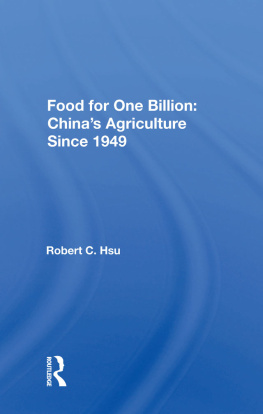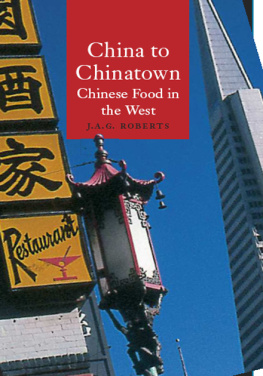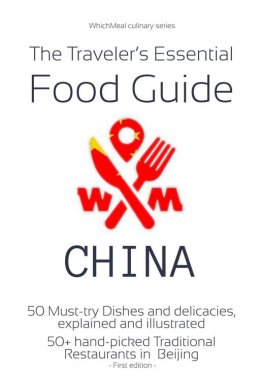A.1.
A.2.
A.3.
A.4.
A.5.
A.6.
A.7.
A.8.
A.9.
PREFACE AND ACKNOWLEDGMENTS
The need for food is a biological reality that all people have in common regardless of age or identity. But while the necessity of consuming food is part of our dependence on nature, our ability to access good food, the meanings we impart to food, and the ways in which food consumption is socially structured and culturally framed differ widely both within and between societies. The production and consumption of food are imbued with different meanings, reflect variable social roles, and are shaped by historical processes.
This book strives to convey the cultural and social centrality of food in Moonshadow Pond, which is the pseudonymous name of a village in southeastern China. Focusing on food in one rural Chinese community provides us with a unique lens through which to understand many aspects of contemporary culture and society in China. These include the play of cultural continuity versus rupture and transformation, ties to the land and peasant identities versus the pull of the city and urban identities, family duties versus the growth of individualism, and an economy based on money and profit versus older forms of exchange that privilege social obligation. Of course, aside from all of these important issues, the role of food in any society is intrinsically important.
In trying to learn about the food culture of Moonshadow Pond, I have been assisted by many people. First and foremost are the residents of Moonshadow Pond. Over the many years I made visits to the village to conduct research for this book, I was warmly welcomed by them. They were always patient with me as they explained the complexities and nuances of their food culture, and as I participated in celebrations, harvests, and ordinary living. My host family in Moonshadow Pond, which I refer to in this text as the family of Songling and Baoli, truly created a home away from home for me. They have never stopped sharing knowledge with me about both the past and the present life of the village.
As I have sorted through my notes from fieldwork, I have tried to analyze and describe what I have learned through scholarly papers, lectures, classes, and discussions with colleagues, especially Paula Schwartz, with whom I have frequently taught a food and culture seminar. Throughout this process I have received excellent feedback. Parts of this book benefited from the comments and input of the following people: Melissa Caldwell, Jakob Klein, Yuson Jong, David Stoll, Eriberto Lozada, Charles Stafford, John Lagerway, David Stoll, Anna Lora-Wainwright, and Adam Chau. I am immensely grateful to all of these individuals.
I also thank Middlebury College for its constant support, both in terms of leave time for sabbaticals and financial support during specific research trips. Without the local hospitality of the Hakka Research Institute of Jiaying University in Meizhou, and in particular the help of Professor Fang Xuejia, I would not have been able to undertake this research, and for that, I am forever indebted to him. Once again, I thank Lee Jyu-Fong for introducing me to Moonshadow Pond and sometimes visiting with me. Thanks also go to my family for going on this journey with me in different ways. My husband, Frank Nicosia, accompanied me on a number of trips, and enjoyed the warmth and hospitality of all our Moonshadow Pond and Meixian friends, and my mother, Edith Oxfeld, has always been happy to read my written work and to provide editorial comments. Ann Donahue copyedited my manuscript and the writing is greatly improved and more streamlined because of her efforts.
Finally, I owe a huge thanks to Yashu Zhang, my student research assistant at Middlebury College. Yashu helped me with so many tasksfrom looking up the Latin names of Chinese food plants, to constructing readable tables on the basis of local agricultural statistics, to compiling a glossary of Chinese terms used in the text. All of those items came about with Yashus help, and I cannot thank her enough.
According to an old Chinese proverb, which aptly applies a food metaphor, A full person cannot truly understand a starving persons hunger. the idea that this knowledge can be communicated to others who were not there.
Without the help I received from everyone cited above, and from many who are not mentioned, I would not have been able to experience and gain knowledge about the food culture of Moonshadow Pond, nor been able to write about it here. But, of course, I take sole responsibility for my success or failure in analyzing and communicating what I have learned in the text that follows.
NOTE ON THE TEXT
Chinese words and phrases are romanized in Mandarin in the text. There is an extensive glossary at the back of the book that contains the Chinese characters for these words and phrases, as well as short notes about their significance.
ONE
The Value of Food in Rural China
AFTER A THREE-YEAR ABSENCE , I was returning to Moonshadow Pond, a village in southeastern China, where I have periodically undertaken field research for almost twenty years.

